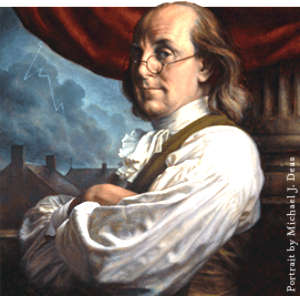
To be perfectly frank, I was expecting to be bored out of my mind reading a biography for two weeks. After all, there's only so much you can say about a person before the details start to numb your brain. But I was pleasantly surprised by this biography. I can't lie and say there were not some sections I had to slog through to get to the end of the chapter, but overall, the author used a good balance of facts and narrative to help the reader get acquainted with Benjamin Franklin, "the most approachable of our founding fathers."
Most people know Ben Franklin for his frugal, witty sayings that are supposed to lead to a successful, happy life or because he was the first to figure out how to tame lightning. We all remember that story we were told in elementary school about the frazzled old man running around in a thunder storm with a kite. What we seldom remember by the time we reach our twenties is that Benjamin Franklin was only forty-five when he did that experiment, and he had already led an utterly successful career. By the age of 18 he was writing a column in his brother's newspaper. By 21 he was a successful printer and knew how to get the attention of the reading public. He went to London for a time, still working as a printer, and published what would be the first of many, many pamphlets that persuaded the public to understand his point of view. (Granted, his first pamphlet was a disaster and he burned as many copies as he could buy back.) When he returned from London, he established his own printing shop, managed to get a job as the postmaster in Philadelphia, started a library, started a volunteer fire fighting unit, organized a militia to defend the town against the French, who were raiding colonies along the Hudson River, started a public university, a hospital and a "think tank" for all the great minds of science and philosophy to come together and share their ideas. (And before you start to be too impressed, let me remind you that this was all BEFORE he was 45 years old.)
After he retired from printing, having set up a nice little agreement with the young man who bought his business, Franklin threw himself whole-heartedly into politics. He loved the American people and wanted to see them band together into a collaborative body that would serve the English commonwealth on equal terms with their brothers in England. (What we don't learn in school is that until war with England was inevitable, Benjamin Franklin was staunchly loyal to the King. He had his differences with Parliament, but he wanted the colonies to remain part of the British Commonwealth.) Franklin served as Postmaster General for Pennsylvania, was a member of the continental congress, served as the American liason to Britain before the revolution and then to France when war broke out. Although most of his political ideas were too much ahead of their time to be accepted, Benjamin Franklin's spirit of tolerance and compromise was perhaps the key factor in the famous meetings of Constitutional Convention when the 13 colonies sat down together to write the American Constitution.
Walter Isaacson's insightful biography makes the argument that Benjamin Franklin is our most approachable founding father because his spirit was so entirely that of a typical American. He knew the value of hard work, rose up from the middle class, and carved his name in the annals of American history. Franklin's life was perhaps the earliest example of the American dream, and we like to think that perhaps we can achieve some of the same success he did. While some would condemn Franklin because his nature tended to be frugal and materialistic without a hint of romance, there will always be those who take his example to heart. A dream is nice to have, but the only way to achieve it is through consistent hard work.
No comments:
Post a Comment